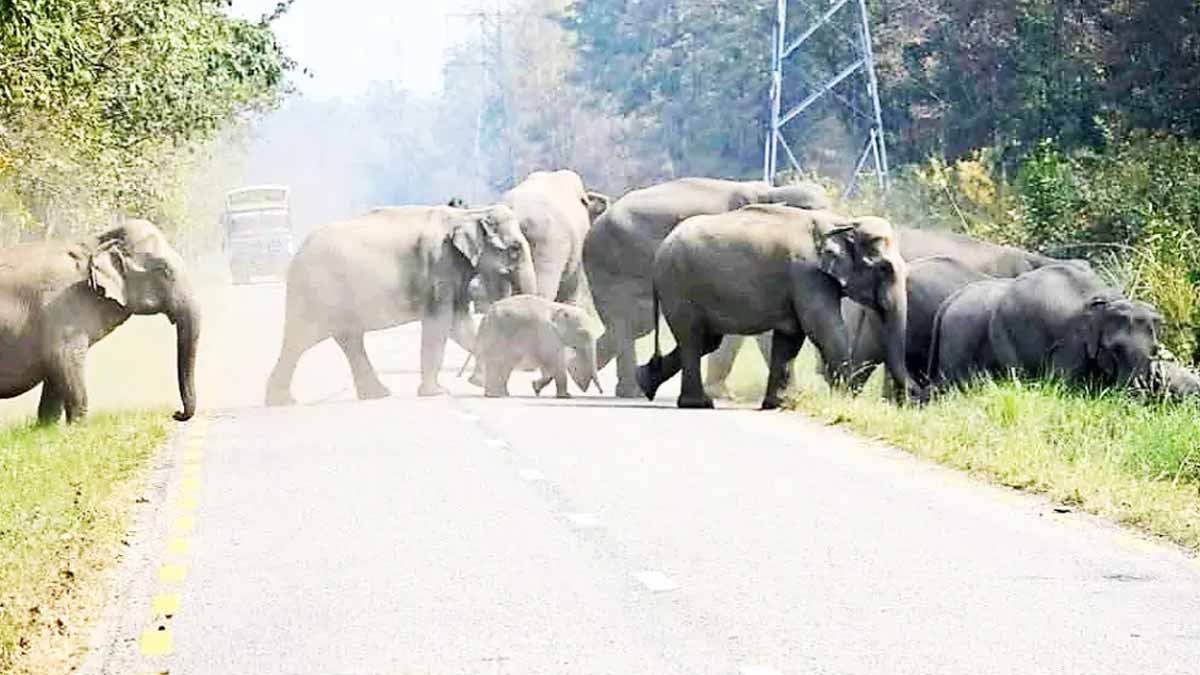One brief pause on a quiet road turned unforgettable. A herd moved with calm purpose as drivers waited, engines low, and space clear. Then the elder stopped, faced the cars, and raised her trunk. The gesture felt deliberate and kind. In that silent second, Grandma Elephant seemed to speak for the whole family. Respect met patience, so the moment settled like a gift. People kept replaying it because grace, even brief, stays with us.
A road crossing that revealed more than a routine passage
They filmed from a car as an entire herd crossed the asphalt in a steady line. Adults formed a moving shield while small bodies tucked in the middle. Babies and toddlers shuffled between careful legs, so the group stayed tight. Drivers held their distance and let the path remain safe.
At the last step, the elder turned back and lifted her trunk toward the humans. Wildlife Rescuers shared the short clip and called it “a quiet, touching moment of respect and gratitude between the animals and the people.” Viewers agreed, since the wave reframed a normal stoplight pause.
That polite salute traveled further than the road. It modeled coexistence in a way rules rarely capture. Grandma Elephant showed that courtesy can be visible, so people noticed. The memory will endure because simple gestures teach fast. A moving herd, a patient line of cars, and one calm thank-you.
How Grandma Elephant makes decisions that guide every step
Elephant families follow a matriarchal order, so the oldest, often largest female leads. She chooses where to find water, how to forage safely, and which paths reduce risk. Her judgment flows from long experience, so the group benefits when conditions change quickly or threats appear.
Herds typically include related females and their young, while adult males leave during adolescence. Those males then live alone or join small bachelor groups. This shift reduces tension inside family units, so mothers and aunties can focus on raising calves and keeping travel smooth when food or rain patterns vary.
Because a matriarch reads landscapes well, she balances speed with safety. She watches calves and edges the herd around ditches, fences, and traffic. Her choices help the youngest learn routes as they grow. Trust forms through repetition, since good decisions become family memory. That memory shows in confident steps.
Inside an elephant family: care, communication, and social bonds
Family members help raise calves, so mothers are never alone with the load. Aunts, sisters, and cousins babysit, nudge, and shield small bodies when noise spikes. Touch matters for reassurance. When a trunk rests on a shoulder, calm returns and the line keeps moving despite wind, dust, or honking far away.
Communication runs on touch, voice, and ground-borne cues. Low-frequency rumbles travel through air and soil, while feet pick up subtle vibrations. Because these signals carry far, the group coordinates over distance, so timing stays tight. A gentle rumble can say wait, regroup, or all clear, even when brush hides the view.
Beneath these signals sits an emotional web. Bonds support learning, protection, and recovery after stress. The matriarch’s memory keeps routes, water points, and safe crossings alive for decades. That storehouse explains why a trunk wave can feel intentional. It fits family language. Grandma Elephant speaks with motion, and we listen.
Numbers, dynamics, and what size means on the move
Elephant Guide notes that a herd can reach up to 100 individuals. Several females and baby calves anchor the unit, and, typically, only one older bull appears near the group. Because large numbers strain resources, big herds split into smaller “units” when needed, then reconnect when conditions improve.
Size shapes risk on roads. More bodies mean longer gaps to cross, so timing matters. A matriarch studies traffic, spacing, and cover, then chooses a moment that reduces exposure. Short bursts carry calves over paint lines while adults flank them. The plan looks simple, yet it rests on quick calculations.
When groups divide, leadership adapts. Each unit holds an experienced female who remembers seasonal routes. Those branches can weave around farms, fences, and ditches more easily than one massive herd. According to Elephant Guide, this flexible structure lets families feed, drink, and rest without over-pressuring one place.
Why gestures from Grandma Elephant matter for coexistence today
Elders carry status in elephant society, except for the matriarch who leads outright. Youngsters learn to greet elders with trunk touches and soft, friendly rumbles. That etiquette builds respect early, so harmony lasts. It also trains calves to read signals fast, then respond without panic when danger rises.
Because respect is expected, simple gestures mean a lot. A trunk lift can signal acknowledgment, reassurance, or let’s continue. When people leave space, these cues stay calm and clear. That wave toward the cars fit this code. It mirrored elephant manners and made patience between species feel normal, not rare.
Humans can help scenes like this end well. Keep engine noise down, hold distance, and wait. Avoid revs, flashes, or drones, because sudden stimuli scramble signals. When we behave with steady courtesy, families cross safely. The road clears quickly, and Grandma Elephant leaves only tracks, not trouble, on the tar.
A brief salute that still echoes beyond the road
The trunk lift still feels fresh because gratitude changes how we remember waiting. A small pause became a shared story, and the road felt kinder after it. Grandma Elephant did not need words to teach patience. She simply modeled it. Because empathy scales fast, one calm gesture traveled far.
